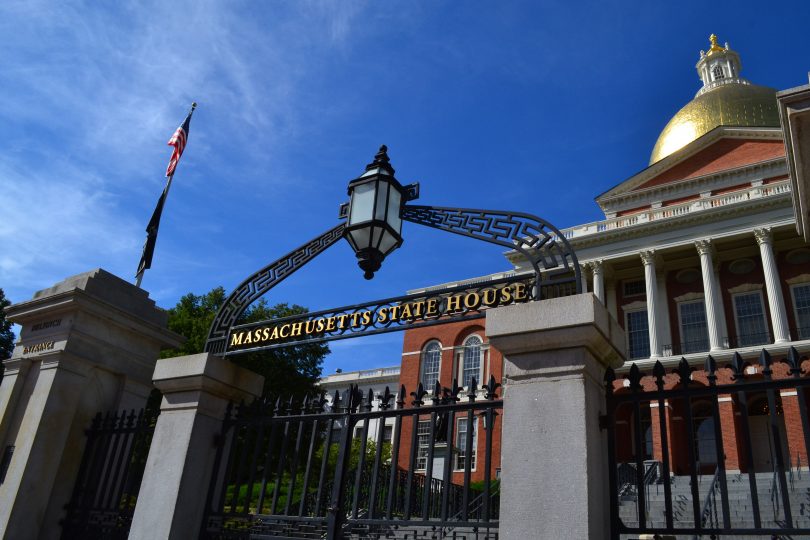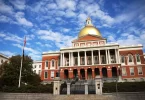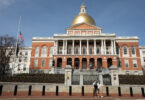By Samantha J. Gross
Boston University Statehouse Program
This article was originally published in the Lowell Sun.
BOSTON — High-income earners in Massachusetts could have reason to leave come November, a new study suggests.
A proposed question on the November general election ballot — alternately known as Fair Share, Proposition 80 or the “Millionaire Tax” — would add a 4 percent tax on income over $1 million. And it could double tax bills for top earners to about $318,000, the Pioneer Institute, a Boston-based research group said in a report released earlier this month.
The proposal to amend Chapter 44 of the Massachusetts Constitution is backed by nonprofit coalition RaiseUp Massachusetts. The question would change a 1917 law that requires a flat income tax for everyone, currently 5.1 percent.
The additional tax revenue will fund transportation and education, according to the proposal. RaiseUP Massachusetts has been involved in other ballot efforts like $15 minimum wage and earned paid sick time.
Using data from agencies like the IRS, Pioneer concluded the proposed change would make Massachusetts’ top marginal income tax rate the nation’s fifth highest. The study points out that key negative effects include high-income earners leaving the state and unfairly taxing one-time “millionaires” who are moved up in tax brackets because of retirement or the sale of a business.
These taxes, the study suggests, will send top-earners to Florida, New Hampshire or other low-tax states, hurting the Massachusetts economy.
The study compares this potential effect to Connecticut, where tax hikes aimed at high-income taxpayers initiated a migration of high-earning individuals and large employers, resulting in declining tax revenue.
Some lawmakers across the state have voiced their own opinions, questioning whether the proposition is legal and worrying about the effect on their constituents.
Rep. David Nangle, a Lowell Democrat, issued a statement saying that tax policy should be set by the Legislature. He said that there’s something “wrong” about the dialogue, and said he and his colleagues are legislators, “not Robin Hood.”
“It’s stealing from the rich to give to the poor,” he said. “We’re shirking our responsibilities. I hope the question does not pass.”
Rep. Stephan Hay, a Fitchburg Democrat, disagreed. He said in a statement that “those who are fortunate enough” to be affected should provide.
“(Millionaires) have a responsibility to contribute more to education and road infrastructure in the commonwealth,” he said.
Rep. Jim Miceli said that the revenue is crucial to repair infrastructure, and that high-earners should pay “their share.”
“It’s a revenue source that we shouldn’t pass up,” the Wilmington Democrat said. “I’ve made up my mind, and I support it wholeheartedly. I know the governor’s opposed to it, and now and again we have to disagree.”
Sen. Jamie Eldridge, an Acton Democrat, tweeted a photo of him grinning with a mug that says, “I oppose Prop. 80.”
Miceli, however, said the predicted out-of-state migration effect is hard to believe.
“I find it hard to believe that people are going to pick up their roots and leave beautiful New England to save some money,” he said.
But Greg Sullivan, the Pioneer Institute’s research director, said Connecticut’s tax crisis was part of the reason General Electric and Alexion Pharmaceuticals moved headquarters to Massachusetts.
The Pioneer study concluded that not only would the question have harmful effects on Massachusetts, but that those effects would be exacerbated because of recent federal tax law, which put a $10,000 cap on deductions for state income and local property taxes.
“This is going to create a double whammy effect,” Sullivan said.
The Tax Foundation, an independent tax policy nonprofit, filed a brief with the Supreme Judicial Court of Massachusetts in January, arguing that Proposition 80 should not appear on the ballot for violating state constitutional prohibitions on “logrolling,” or exchanging favors, and usurping legislative control of the state treasury.
The state constitution also outlaws petitions from including a “specific appropriation,” which means taking all revenue from a source and using it to pay a particular demand, like transportation and education in this case.
The SJC heard arguments on the question on Feb. 6 and a ruling is expected by early summer on whether the proposal will remain on the ballot.
Sen. Eileen Donoghue, a Lowell Democrat, said regardless of the ruling and the ultimate fate of the ballot question, she “intends to work through the budget process to fight for sufficient funding to address the real education and transportation needs of the commonwealth’s residents.”
A January report by the Massachusetts Budget and Policy Center, a left-leaning think tank, concluded that federal tax cuts will reduce taxes paid by the top 1 percent of Massachusetts earners by over $2.96 billion in 2019, adding up to about $82,720 per household. For the middle 20 percent of taxpayers, that adds up to $1,090.
Paul Craney, a spokesman for the Massachusetts Fiscal Alliance, said he thinks organizations funding the proposal are “hoping taxpayers are not smart enough” to understand the consequences.
“If passed, Prop. 80 would be the most disastrous tax policy for Massachusetts in a generation,” Craney said.
Steve Crawford, a spokesman for RaiseUp Massachusetts, countered those who agreed with the study’s findings, citing the “millionaire flight” is a myth.
Crawford cited examples like California, which taxes high-earners: “California is thriving, just like our state is,” he said.
“The wealthy are not paying a proportionate share of their income to keep our state strong and vibrant,” he said. “We believe dedicating it to these two areas through a constitutional amendment was the most appropriate way to provide a long-term revenue source to strengthen the commonwealth.”
The Boston Business Journal’s “Wealth Report” reported hundreds of taxpayers on the North Shore and in Merrimack Valley who reported $1 million in income in 2014, the most recent tax year available. Andover had the most — 264 filers, followed by Marblehead with 168, North Andover with 116 and Beverly with 99. Statewide, residents who reported $1 million in income in 2014 added up to 15,273.
Also on the November ballot will be a question of lowering sales tax, sponsored by the Retailers Association of Massachusetts. If both the lower sales tax and the income tax surcharge question pass, it could result in zero gain for the state. If only a sales tax cut passes, it could create a revenue hole.





